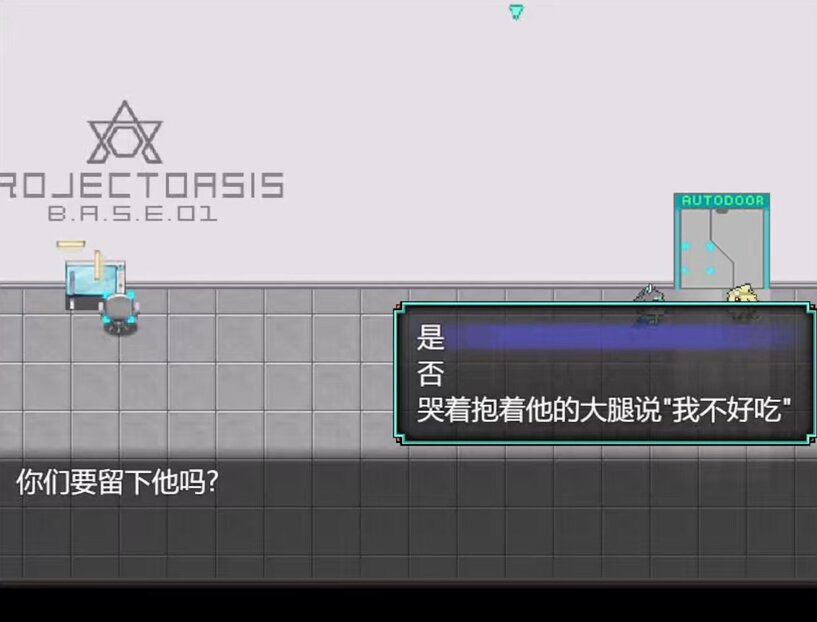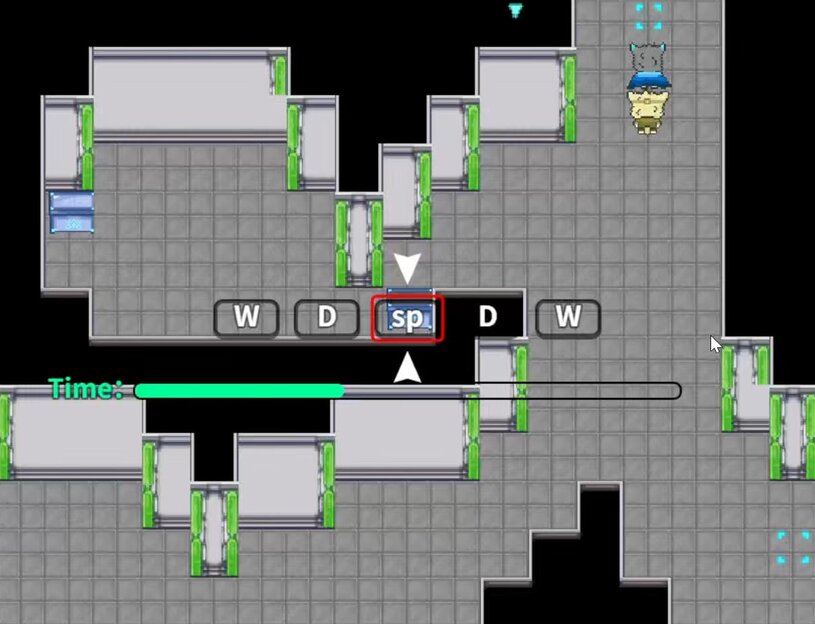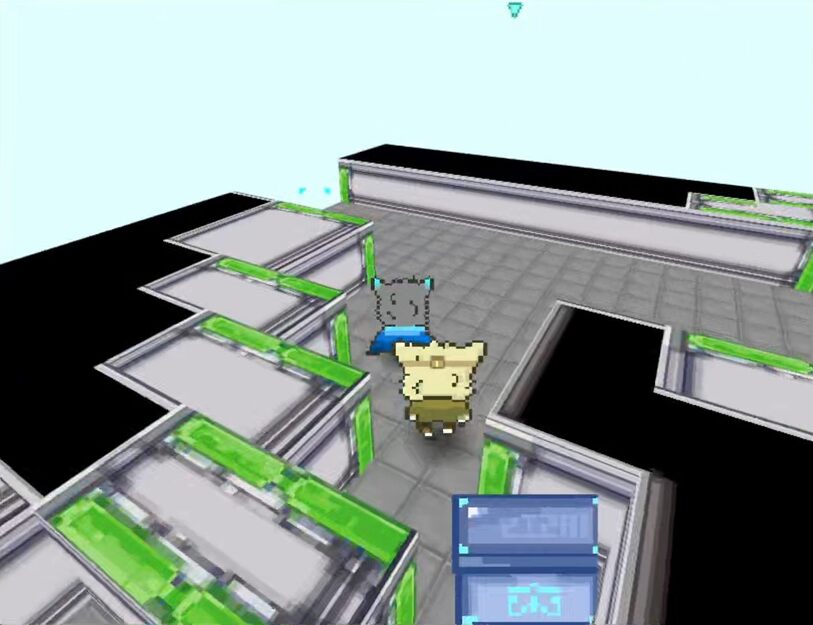Project Oasis - 6/10
When Astell awakens from 3,000 years of cryosleep, he finds himself on a world that has stopped rotating, chosen as a “Child of the Stars.” Project Oasis attempts to tell a story about hope, sacrifice, and rebirth—exploring what constitutes “true happiness for all” in the Prometheus system where humans and anthropomorphic animals coexist. As a free furry-themed RPG Maker game, it displays admirable narrative ambition, but technical limitations and excessive “homages” ultimately drag down the overall experience.
Steam page: https://store.steampowered.com/app/1168840/_/
Price: Free
A Sincere Story Stitched From Familiar Pieces
Project Oasis’s greatest strength lies in its narrative ambition. The game unfolds a complete adventure across a tight three-hour runtime: protagonist Astell awakens from 3,000 years of cryosleep and embarks on a journey to repair a planet that has stopped spinning. In this system where humans and anthropomorphic animals coexist, he meets new companions and together they face choices about “hope” and “sacrifice.”
Pacing is tight and confident. There are no lengthy dialogues or repetitive puzzles. Nearly every scene advances the unraveling mystery. Character relationship development feels natural and layered, with companion interactions being particularly convincing. The latter half, though, feels overly familiar—its many “homages” to classic titles end up undermining what could have been a more original story. Players can clearly sense the narrative structure, meta design, and moral choice systems reminiscent of Undertale and OneShot, making what was once unique storytelling gradually feel filled with déjà vu. Even when moved by Astell’s choices, you can’t help thinking “I’ve already experienced all this with Niko.”
Despite this, Project Oasis still manages to touch hearts at key emotional beats. It hits genuine emotional notes, even within its modest scope, and even with imperfect execution, you can feel the creator’s passion.

(“Will you let him stay?” “Yes / No / Cry and cling to his legs, saying, I’m not tasty.”)
Gameplay: Solid, but Nothing New
As an RPG Maker title, Project Oasis features fairly traditional gameplay. The core loop revolves around exploration, puzzles, and collecting, occasionally interspersed with combat and QTE sequences. The game flow is quite linear, but this also means you won’t waste time in meaningless mazes—for a three-hour experience, this is the right design choice.
Unfortunately, the combat and QTE sections feel rough, with both reaction detection and rhythm feedback lacking polish. The later portions also contain obvious technical glitches, with some cutscene sequences potentially failing to trigger properly. These issues are especially jarring during emotional climaxes, forcibly pulling you out of the story’s immersion.

Presentation: Sincere Effort, Limited Execution
One commendable aspect of Project Oasis is the creator’s dedication—without relying heavily on external assets, the developer single-handedly handled programming, writing, art, and music for the entire production. You can feel the creator’s sincerity.
However, sincerity doesn’t equal quality. The scene tilesets are serviceable, but never impressive, merely fulfilling basic functional requirements. Character portraits and illustrations are similarly mediocre, with lines and colors appearing somewhat “muddy.” When Astell and Mizi face life-and-death trials, the presentation simply can’t carry the emotional weight the script reaches for.
Strangely, the game incorporates some 3D scene plugins, but these 3D elements give off a “free asset library trial period” vibe. In certain scenes, the perspective switches to third-person 3D, yet all characters and scene elements remain 2D sprites that perpetually face the camera—creating a “pseudo-3D” effect reminiscent of early DOOM. The problem is these 3D scenes contribute almost nothing to the narrative while feeling jarring due to inconsistent visual style and control schemes. Disabling this feature entirely might provide a better experience.
The soundtrack is another obvious weakness. The music sounds like a single piano track placed directly in FL Studio, with extremely simple melodies lacking depth and emotional resonance. The background music loops monotonously, failing to enhance the atmosphere at critical moments. During what should be impactful climaxes, the crude soundtrack actually diminishes the story’s emotional impact.
To be fair, these audiovisual issues largely stem from technical and resource limitations. The effort shows, even if the polish doesn’t. When the game attempts to tell a grand sci-fi epic, this technical poverty becomes an impossible-to-ignore obstacle.

Controversy: The Steam Empty Shell Incident
It’s necessary to specifically mention a highly controversial action by the developer during 2021-2022. While this doesn’t affect the game’s score itself, it’s still worth noting as community record.
Project Oasis was initially released in 2020, and the developer later decided to remake the game. The issue was that during the remake period, rather than delisting the game or preserving the old version for players, the developer replaced the Steam page content with an empty shell program—essentially a “we’re remaking this, so you have no game to play right now” notification.
This decision led to uninformed players downloading what turned out to be an empty shell, promptly leaving negative reviews. However, instead of reflecting on the inappropriateness of this practice, the developer went as far as to call out a reviewer publicly on the Steam store page, accusing them of “not wanting domestic games to succeed,” and left this accusatory text on the page long-term. This triggered defensive rallying from the developer’s fan community, forming a small-group reactionary response.
Regardless of the developer’s intentions, uploading an empty shell program to occupy a Steam page was inappropriate to begin with. Steam’s store pages should showcase actual playable game content—a game details page must have a game ✍. Calling out critics publicly is, to put it mildly, unprofessional.
This incident isn’t part of the game content, so it doesn’t affect this review’s 6/10 score, which is based purely on the game’s narrative, gameplay, and technical performance. But as community record, it’s a footnote worth remembering.
Verdict
Project Oasis is a work full of contradictions. It has sincere creative intentions and a decent narrative core, but is severely hampered by technical limitations, excessive homages, and presentation glitches. You can feel the developer’s passion for telling a good story, but you can also clearly see the boundaries of their capabilities.
The script’s emotional core is genuine, with elements that have the potential to move hearts. The problem is when this story is wrapped in rough audiovisual presentation and OneShot’s narrative framework, these emotions struggle to fully reach players.
For furry game enthusiasts and supporters of indie games, this remains a three-hour journey worth experiencing. Just be prepared: you’ll encounter abundant “homages,” be pulled out of immersion by rough presentation, and face bugs during moments that should be moving.
Score: 6/10 - Okay
Project Oasis gets some important things right, but also leaves too many regrets. If you’re interested in furry themes or meta-narrative RPGs and don’t mind technical crudeness, the free price makes it worth a try.